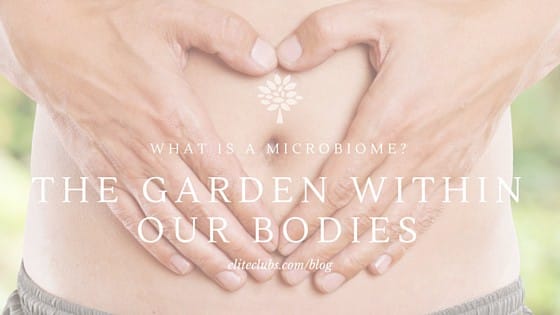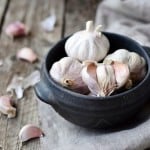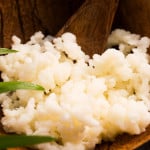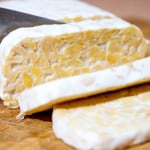
For every cell in our bodies, there are about 10 “non-human” cells. These are microbial residents of our gut, skin, eyes, and nasal passages and are referred to as the “microbiome” and research of its role in human health has revealed enough surprising discoveries that the National Institute of Health has launched an International Human Microbiome Project.
The human microbiome refers specifically to the community of microorganisms that live in and on the human body and their collective genome, which interacts with our host genes. These microbes are affected by everything in our world that we touch or come in contact with. Bacteria, yeast, molds, dirt, and the types of food we eat all impact this sub-system culture.
Gut bacteria aid digestion by breaking down otherwise indigestible plant fibers into short-chain fatty acids that intestinal cells can access. Recent research suggests that gut bacteria influence many other metabolic functions, so much so that some experts now regard it as a “hidden” organ system, capable of interacting with its host down to the DNA expression. As a result, the microbiome’s role in conditions as varied as irritable bowel syndrome, obesity, Type 2 diabetes, depression, and autoimmune disorders is under intense scientific scrutiny. So, how does the microbiome become altered in a way that will affect the host, and how does a host build better microbiota?
From the very beginning babies are exposed to their mother’s microbial mix. How they are born, what their first foods are, and if they are breast fed, will all affect the newborn’s developing intestinal community; rather, what will exist in their gut, as well. From birth on, babies will begin to develop their own bacterial mix; and, by age 2, the child’s microbiota resembles that of the adult.
What is in your system is a stable mix of environment and diet. This system remains as it is and will influence our metabolism, physiology, nutrition, and immune function. One of the things that will influence a person’s system is taking antibiotic medications. The ability of the microbial residents to bounce back after a round of antibiotics varies greatly among individuals, and multiple rounds of antibiotics can significantly shift the types of microbes that survive.
Dietary changes can also significantly alter the microbiome, and preliminary human studies suggest that these changes can occur in as little as three days. As well, while what we eat alters our microbiomes, the microbiota also appear to influence what we choose to eat, as microbes compete for space and nutrients. This process, however it tends to proceed in the individual, tends to be rooted in inflammation, endotoxemia and other changes in the immune system, and treating the gut is something that registered dietitians are quickly becoming aware of how to treat. So, what are the different forms of probiotics that have come to be a beneficial form of intervention?
Prebiotics are dietary compounds that promote the growth of beneficial bacteria. They’re not absorbed by the host, but act as foods for the microbes.
Probiotics are are beneficial bacterial strains that can be ingested through the diet in the form of naturally fermented foods or probiotic supplements.
Sunbiotics are combinations of probiotics and prebiotics.
All of the supplements carry a specific targeted purpose in the gut. It is best to take a high quality product, that carries with it several different strains of bacteria that will increase success.
But what about your Dietary intake?
Amid the mounting interest in its influence on human health and disease, attention has been turned in therapeutic approaches that target the gut. A diet high in fiber, as fruit, vegetables, and whole grains, allows beneficial bacteria to dominate and inhibits the growth of harmful strains. While the research has not been completed at this current time, here are a few suggestions in the meantime for your dietary intake:
Fruits and Vegetables: A plant-centric diet rich in vegetables, fruits and legumes, and high in dietary fiber and polyphenols, appears to be very successful in the gut. These foods offer intestinal bacteria fuel in the form of prebiotics.
Fermented Foods: These particular foods may not stay in the gut for long. However, they may affect the microbiota that is already there by influencing the gene expression of the bacteria. Some of the fermented foods that are now recommended are yogurt, and kefir with live active cultures, sauerkraut, kimchi, tempeh and raw vinegar, are all high in beneficial bacteria. To get the benefits, be sure that the foods are “lacto-fermented” or naturally fermented and raw or unpasteurized, as pasteurization kills beneficial bacteria.
Garden Herbs: Garlic and leeks contain natural sources of the prebiotic insulin. Garlic also has antimicrobial properties, which may help suppress pathogenic bacteria and foster beneficial bacteria growth.
Focus on the Freshest: Enjoy minimally processed foods and limit sugar and unhealthy fats, especially trans fats. Some studies have associated diets of highly-processed foods with the dysfunction and a pro-inflammatory process.
While there is still much information to be studied and presented to the general population, it is for sure that probiotics and their natural forms are something which are going to greatly affect the future of and the success of new dietary answers for gut health.
The products that I like best are the ones that are natural in form, as in a plant form, rather than in pill form. Nevertheless, you must find those products that work best for your personal diet and for your own gut health.
Written by Rita Larsen, RDN, CD; Elite Sports Clubs Nutrition Educator & Diet Counselor
Rita is certified in Positive Psychology, University of Penn; has a BS in Dietetics from Kansas State University; and an Internship and Masters at the Indiana University Medical Center.
Schedule a Nutrition Consultation





